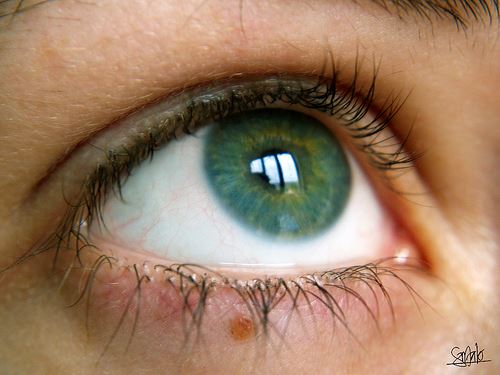In Spanish, there are some words related with the parts of the human body.
For example, “Muscle” comes from “Mouse” –or better: “Little mouse”. “Musculo” is formed with the two words: “Mus” that means “Ratón” = “Mouse” and “Culus” that means “Little”. It started to name the top of a leg; but, after it was used for the rest of the body and the top of the leg was named “Muslo”.
By other side, the word “Pulmón” = “Lung” comes from the latin word ,“Pulmo” and this one comes from the greek word, “Pneumo”, that has to do with the word “Neumo2, that means air or blow and, from it, comes “Neumatico” (of a wheel) = Tire –because it is full of air--.And also from it comes the Pneumonia disease.
Another word “Pupila” = “Pupilos”, that was de diminutive of “Pupus” –that means “Child”--.Then, Pupilos means “Little child” or even “Little doll”.

"Ojo Eva" by chalo84, at flickr.com
There are two other words, that means the same thing: Encéfalo and Cerebro. “Encéfalo” comes from the Greek and it is what is inside of a head. And Brain is which leads into the skull.
There are also some words related between them; the y are: Psycology and others, that come from “Psiqué”, that in Greek meant: “Mariposa” = “Butterfly”. It was a metaphor, because greek people thought that Soul was as a butterfly. They thought that when the died, the body was separated from the soul and then, the soul was flying around like a butterfly.
Also, the word “Clavícula” = “Clavicle” means: little key, because it has that form.
I hope that you have liked it, as I have.
Till soon, kind regards,
Luis.
Sponsored by Costaluz Lawyers.
Please click down here:
.jpg)